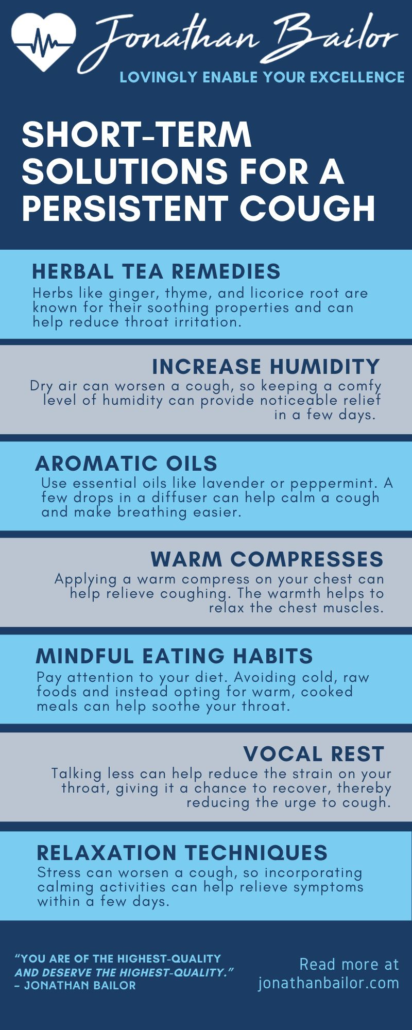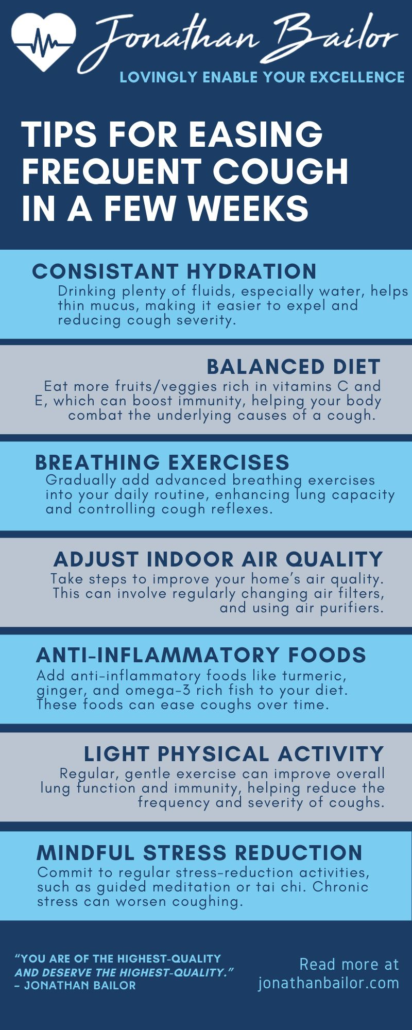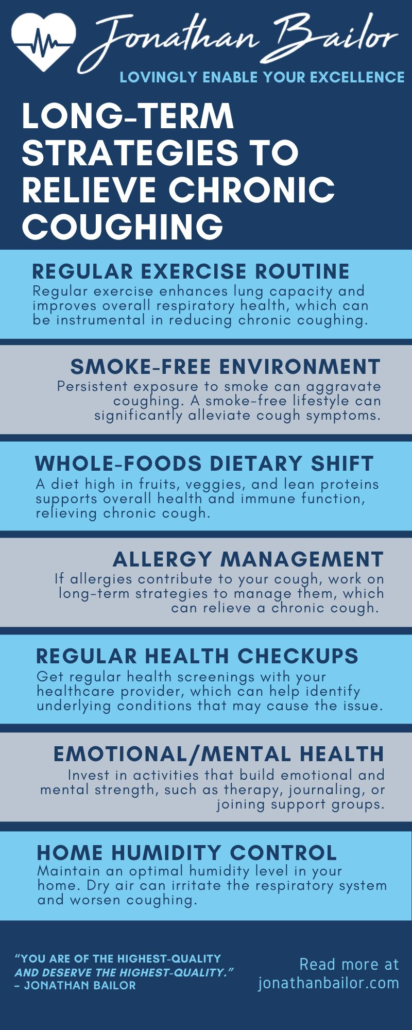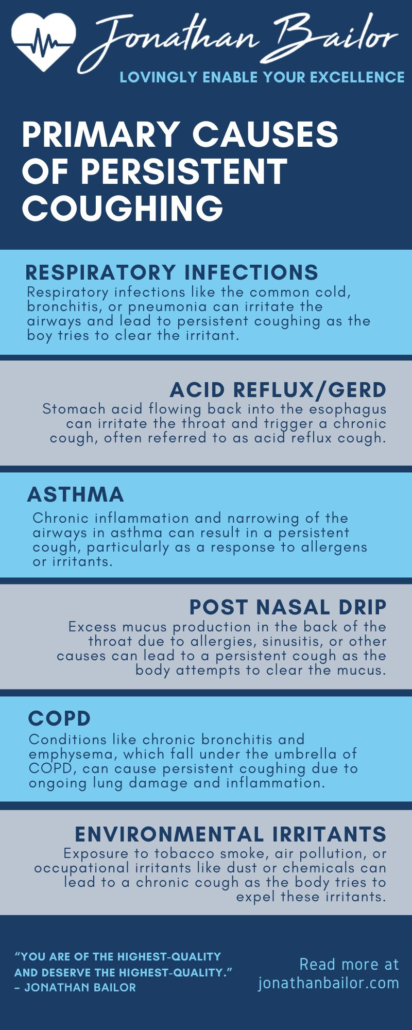Soothing Secrets: 28 Home Remedies for Persistent Cough at Every Stage
It’s cold season, you need these 28 home remedies for persistent cough at every stage of your recovery in this cough and phlegm guide with Jonathan Bailor!
When a persistent or acute cough lingers, turning days into a symphony of discomfort, finding relief becomes a priority. This guide is a treasure trove of home remedies, natural cough remedies that whisper of comfort in the face of a stubborn cough. These remedies are more than mere suggestions; they are time-tested, evidence-based solutions that offer respite at every stage of a persistent cough.
Get cough free with our 24 Proven Treatments That Help to Get Rid of Phlegm or 14 Evidence-Based Home Remedies For Persistent Cough guides next!
S
Embark on a journey of discovery, where each remedy is a step towards regaining your comfort and peace. From the quiet corners of herbal wisdom to the soothing rhythms of natural concoctions, this guide brings you closer to a world where a persistent cough is but a temporary challenge, not a lasting ordeal.
This isn’t just about temporary relief; it’s about understanding your body’s language and responding with nurturing care. Each remedy is an invitation to embrace a gentler approach to health, one that harmonizes with your body’s natural healing rhythms.
So, as you dive into this guide, remember that you’re not just reading for yourself; you’re gathering wisdom that can comfort others. Share these insights with friends and family, and spread the word on social media. Together, let’s turn the tide against persistent coughs, bringing soothing secrets into every home.
Home Remedies for Persistent Cough: Immediate Actions
1. Stay Hydrated
Begin by sipping warm water throughout the day. This simple, immediate step helps soothe your throat and moisten the mucous membranes, easing the irritation that often triggers a cough. Think of each sip as a gentle wave, washing over the discomfort in your throat.
2. Steam Inhalation
Utilize the power of steam right away. Boil water, pour it into a bowl, and carefully inhale the steam. Steam inhalation is one of the top natural remedies to help loosen the phlegm and provide instant relief. For an added benefit, add a few drops of eucalyptus oil or peppermint oil to the water for their natural decongestant properties.
3. Gargle with Salt Water
An immediate remedy that can be done at home is gargling with warm salt water. This natural cough remedy helps reduce throat inflammation and loosen mucus, offering swift relief. Simply dissolve a teaspoon of salt in a cup of warm water and gargle several times a day.
4. Honey and Lemon
Combine a teaspoon of honey with a few drops of lemon in warm water. This combination works wonders in immediately soothing a sore throat and reducing cough, which is why it’s a frequent ingredient in cough drops and homemade cough syrup. Many people use honey and lemon to treat their cold symptoms. Honey has natural antibacterial properties, while lemon adds a dose of vitamin C.
5. Adjust Your Sleeping Position
Elevate your head with extra pillows when you go to bed. This simple change can stop mucus from accumulating in your throat, which often worsens nighttime coughing. It can make a significant difference in easing your cough immediately.
6. Breath Control
Practice controlled breathing techniques. Slow, deep breaths followed by controlled exhales can help calm a cough. This immediate change in breathing pattern can help soothe your cough reflex and bring quick relief.
7. Avoid Irritants
Immediately minimize exposure to irritants like smoke, dust, and strong fragrances. These can exacerbate your cough. Keeping your environment clean and free from these irritants can provide instant relief.
Each of these immediate changes can be a stepping stone towards relief from a persistent cough, offering comfort and ease in the now. Remember, sometimes the simplest actions can lead to significant relief.

Feeling Better Is Priceless, That's Why We Don't Put A Price On It!
“It’s Like A Free and Medically Valid Version of Noom and Weight Watchers Online”
~ Dr. Doctor Matthew Oleshiak, MD
Click the 'LEARN MORE' button below for free lifetime access to the fast fix program developed by Jonathan and top Ivy League Medical Doctors
LEARN MOREP.S. It's not a free trial. It's not part of the program for free. The entire program is free, forever, for real! No credit card needed.
Short-Term Strategies for Easing a Persistent Cough
1. Herbal Tea Remedies
Over the next few days, incorporate herbal teas like ginger, thyme, marshmallow root extract, or licorice root into your routine. Ginger tea is known to help relieve cold symptoms like persistent cough. These herbs are known for their soothing properties and can help reduce throat irritation. The warmth of the tea also provides comfort, making this an ideal short-term remedy.
2. Increase Humidity
Use a humidifier in your sleeping area to add moisture to the air. Dry air can exacerbate a cough, so maintaining a comfortable humidity level can provide noticeable relief in a few days. A humidifier’s ability to help suppress coughs can also improve sleep quality, helping boost your immune system.
3. Aromatic Oils
Explore the use of essential oils like lavender or peppermint. A few drops in a diffuser can help calm a cough and make breathing easier. These oils can provide a sense of relaxation, which is beneficial when dealing with a persistent cough.
4. Warm Compresses
Applying a warm compress to your chest can help alleviate coughing. The warmth helps to relax the muscles, potentially reducing the frequency of coughing spells. This can be done several times a day for gradual relief.
5. Mindful Eating Habits
Pay attention to your diet over these days. Avoiding cold, raw foods and instead opting for warm, cooked meals can help soothe your throat. Spicy or acidic foods that might irritate the throat should be minimized.
6. Vocal Rest
If possible, give your voice a rest for a few days. Talking less can help reduce the strain on your throat, giving it a chance to recover, thereby reducing the urge to cough.
7. Relaxation Techniques
Embrace relaxation practices like gentle yoga or meditation. Stress can exacerbate a cough, so incorporating calming activities can help alleviate symptoms within a few days.
These short-term changes are simple yet effective ways to gently guide your body toward relief from a persistent cough. By giving your body the right environment and care, you can make significant strides in alleviating discomfort in just a few days.

Medium-Term Approaches to Managing Persistent Cough
1. Consistent Hydration Routine
Over the next few weeks, focus on maintaining consistent hydration. Drinking plenty of fluids, especially water, helps thin mucus, making it easier to expel and reducing cough severity. Aim for a steady intake throughout the day, not just when the cough feels more intense.
2. Balanced Diet
Enriched with Vitamins: Introduce more fruits and vegetables rich in vitamins C and E into your diet. These vitamins are known for their immune-boosting properties, which can help your body combat the underlying causes of a cough. This change in diet over a few weeks can strengthen your immune response.
3. Progressive Breathing Exercises
Gradually incorporate more advanced breathing exercises into your daily routine. Techniques like diaphragmatic breathing can enhance lung capacity and control over your cough reflex. Regular practice over several weeks can yield noticeable improvements.
4. Evaluate and Adjust Indoor Air Quality
Over a few weeks, take steps to improve the air quality in your home. This can involve regularly changing air filters, using air purifiers, and ensuring proper ventilation. Cleaner air can reduce irritants that trigger coughing.
5. Incorporate Anti-inflammatory Foods
Add anti-inflammatory foods like turmeric, ginger, and omega-3-rich fish to your diet. These foods can help reduce respiratory system inflammation, easing cough symptoms over time.
6. Gradual Increase in Light Physical Activity
If your health permits, gradually increase light physical activities like walking or swimming. Regular, gentle exercise can improve overall lung function and immunity, helping to reduce the frequency and severity of coughs over the medium term.
7. Mindful Stress Reduction
Commit to regular stress-reduction activities, such as guided meditation or tai chi. Chronic stress can impact immune function and exacerbate coughing, so finding ways to relax and unwind can positively affect your symptoms over a few weeks.
Implementing these medium-term changes can create an environment conducive to healing and managing a persistent cough. While immediate relief is important, these strategies focus on strengthening your body’s natural defenses and respiratory health over a longer period of time, setting the stage for lasting improvements.

Long-Term Strategies for Persistent Cough Relief
1. Establishing a Regular Exercise Regimen
Over the long term, develop a consistent exercise routine that includes activities like brisk walking, swimming, or cycling. Regular exercise enhances lung capacity and improves overall respiratory health, which can be instrumental in reducing chronic coughing.
2. Cultivating a Smoke-Free Environment
If you smoke, consider a long-term plan to quit. Likewise, avoid environments with secondhand smoke. Persistent exposure to smoke can aggravate coughing and harm respiratory health. Over months, a smoke-free lifestyle can significantly alleviate cough symptoms.
3. Progressive Diet Shift Toward Whole Foods
Gradually transition to a diet rich in whole foods, reducing processed and sugary foods. A diet high in fruits, vegetables, and lean proteins supports overall health and immune function, which can, in turn, alleviate chronic respiratory issues.
4. Allergy Management
If allergies contribute to your cough, work on long-term strategies to manage them. This might include regular allergy testing, environmental modifications, or ongoing medication. Effective allergy management can significantly reduce cough-inducing irritants in your environment.
5. Regular Health Check-Ups
Commit to regular health screenings and check-ups with your healthcare provider. Long-term monitoring of your overall health can help identify and address underlying conditions that may contribute to persistent coughing.
6. Building Emotional and Mental Resilience
Invest in activities that build emotional and mental strength, such as therapy, journaling, or joining support groups. Emotional well-being directly impacts physical health, including the body’s ability to combat illnesses that cause coughing.
7. Home Humidity Control
Over the long term, maintain an optimal humidity level in your home. Dry air can irritate the respiratory system and exacerbate coughing, while overly humid conditions can encourage mold growth. Investing in a good-quality humidifier or dehumidifier, depending on your need, can make a significant difference.
Implementing these long-term changes requires dedication and consistency, but the payoff is substantial. By addressing the root causes of persistent coughing and promoting overall respiratory health, these strategies aim not only for immediate relief but also for enduring wellness and comfort.

Frequently Asked Questions About Coughing & Phlegm
1. What causes persistent coughing and phlegm build-up?
Persistent coughing and phlegm build-up are often caused by upper respiratory tract infections like the common cold, flu, or acute bronchitis. Allergies, asthma, and environmental irritants like smoke or dust can also contribute. In some cases, gastroesophageal reflux disease (GERD) can cause a chronic cough. It’s important to understand the underlying cause to address these symptoms effectively.
2. When should I be concerned about my cough?
A cough that persists for more than three weeks, is accompanied by shortness of breath, blood, or significant phlegm, or is disruptive to daily life warrants medical attention. If the cough is severe, sudden, or associated with other symptoms like fever or chest pain, seeking immediate medical advice is crucial.
3. Are there effective home remedies for reducing phlegm?
Yes, several home remedies can help reduce phlegm. Staying hydrated, inhaling steam, and using a humidifier to moisten the air can loosen mucus. Warm liquids like tea or soup can soothe the throat and reduce phlegm. Gargling salt water may also help clear mucus from the back of the throat.
4. Can lifestyle changes impact coughing and phlegm?
Absolutely. Avoiding smoking, reducing exposure to pollutants, and managing allergies can significantly reduce coughing and phlegm. A healthy diet and regular exercise can also strengthen your immune system, making you less susceptible to infections that cause coughing and phlegm.
5. Does the change of seasons affect coughing and phlegm?
Yes, the change of seasons can impact coughing and phlegm production. Cold weather can irritate the respiratory system, leading to more coughing and phlegm. Additionally, seasonal allergies in spring and fall can trigger these symptoms. Staying warm, using air purifiers, and being mindful of allergen exposure can help manage these seasonal effects.

Embracing Wellness: A Shared Journey
As we conclude this exploration of home remedies and lifestyle changes for managing persistent cough and phlegm, remember that wellness is a shared journey. These tips, grounded in simplicity and care, offer more than just relief; they invite a lifestyle of health and harmony. Share this guide with friends and family, sparking conversations that matter. Spread the word through email and social media, for when one of us thrives, we all move closer to a world of well-being. Together, let’s embrace these natural solutions and foster a community committed to health at every stage of life.
Feeling Better Is Priceless, That's Why We Don't Put A Price On It!
“It’s Like A Free and Medically Valid Version of Noom and Weight Watchers Online”
~ Dr. Doctor Matthew Oleshiak, MD
Click the 'LEARN MORE' button below for free lifetime access to the fast fix program developed by Jonathan and top Ivy League Medical Doctors
LEARN MOREP.S. It's not a free trial. It's not part of the program for free. The entire program is free, forever, for real! No credit card needed.




